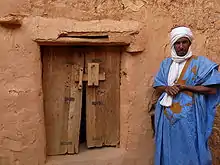Portal:Mauritania
The Mauritania Portal - بوابة موريتانيا
Mauritania, officially the Islamic Republic of Mauritania (Arabic: الجمهورية الإسلامية الموريتانية), is a sovereign country in Northwest Africa. It is bordered by the Atlantic Ocean to the west, Western Sahara to the north and northwest, Algeria to the northeast, Mali to the east and southeast, and Senegal to the southwest. Mauritania is the 11th-largest country in Africa and the 28th-largest in the world, and 90% of its territory is situated in the Sahara. Most of its population of 4.4 million lives in the temperate south of the country, with roughly one-third concentrated in the capital and largest city, Nouakchott, located on the Atlantic coast. The country's name derives from the ancient Berber kingdom of Mauretania, located in North Africa within the ancient Maghreb. Berbers occupied what is now Mauritania beginning in the third century AD. Arabs under the Umayyad Caliphate conquered the area in the late seventh century, bringing Islam, Arab culture, and the Arabic language. In the early 20th century, Mauritania was colonized by France as part of French West Africa. It achieved independence in 1960, but has since experienced recurrent coups and periods of military dictatorship. The most recent coup, in 2008, was led by General Mohamed Ould Abdel Aziz, who won subsequent presidential elections in 2009 and 2014. He was succeeded by Mohamed Ould Ghazouani following the 2019 elections, which were considered Mauritania's first peaceful transition of power since independence. Mauritania is culturally and politically part of the Arab world; it is a member of the Arab League and Arabic is the sole official language. The official religion is Islam, and almost all inhabitants are Sunni Muslims. Despite its prevailing Arab identity, Mauritanian society is multiethnic; the Bidhan, or so-called "white moors", make up 30% of the population, while the Haratin, or so-called "black moors", comprise 40%. Both groups reflect a fusion of Arab-Berber ethnicity, language, and culture. The remaining 30% of the population comprises various sub-Saharan ethnic groups. Despite an abundance of natural resources, including iron ore and petroleum, Mauritania remains poor; its economy is based primarily on agriculture, livestock, and fishing. Mauritania is known for its poor human-rights record, most notably the continued practice of slavery, a result of a historical caste system between the Bidhan and Haratin. It was the last country in the world to abolish slavery, in 1981, and criminalized it only in 2007. (Full article...) Selected article -
The Soninke people are a West African Mande-speaking ethnic group found in Mali, Fouta Djallon, southern Mauritania, eastern Senegal, Guinea and The Gambia. They speak the Soninke language, also called the Serakhulle or Azer language, which is one of the Mande languages. Soninke people were the founders of the ancient empire of Ghana or Wagadou c. 300–1240 CE, Subgroups of Soninke include the Maraka and Wangara. When the Ghana empire was destroyed, the resulting diaspora brought Soninkes to Mali, Mauritania, Senegal, Gambia, Burkina Faso, Côte d'Ivoire, Guinée-Conakry, modern-day Republic of Ghana, Kano in Nigeria, and Guinea-Bissau where some of this trading diaspora was called Wangara. Predominantly Muslims, the Soninke were one of the early ethnic groups from West Africa to convert to Islam in about the 10th century. The contemporary population of Soninke people is estimated to be over 2 million. The cultural practices of Soninke people are similar to the Mandé peoples, and those of the Imraguen of Mauritania. They include traditional Islamic rites of marriage, circumcision, and have social stratification. (Full article...)
| ||||||||||||||||||||||||||||||||||||||||||||||||||||||||||||||||||
 |
You are invited to participate in WikiProject Mauritania, a WikiProject dedicated to developing and improving articles about Mauritania. |
Topics in Mauritania
Cities and towns
| Rank | Name | Region | Pop. | ||||||
|---|---|---|---|---|---|---|---|---|---|
 Nouakchott  Nouadhibou |
1 | Nouakchott | Nouakchott | 1,195,600 |  Kiffa | ||||
| 2 | Nouadhibou | Dakhlet Nouadhibou | 118,167 | ||||||
| 3 | Kiffa | Assaba | 60,005 | ||||||
| 4 | Néma | Hodh Ech Chargui | 57,000 | ||||||
| 5 | Rosso | Traza | 51,026 | ||||||
| 6 | Kaédi | Gorgol | 45,539 | ||||||
| 7 | Zouérat | Tiris Zemmour | 44,469 | ||||||
| 8 | Sélibaby | Guidimaka | 26,420 | ||||||
| 9 | Atar | Adrar | 25,190 | ||||||
| 10 | Aïoun | Hodh El Gharbi | 22,796 | ||||||
Communes
Associated Wikimedia
The following Wikimedia Foundation sister projects provide more on this subject:
-
 Commons
Commons
Free media repository -
 Wikibooks
Wikibooks
Free textbooks and manuals -
 Wikidata
Wikidata
Free knowledge base -
 Wikinews
Wikinews
Free-content news -
 Wikiquote
Wikiquote
Collection of quotations -
 Wikisource
Wikisource
Free-content library -
 Wikiversity
Wikiversity
Free learning tools -
 Wikivoyage
Wikivoyage
Free travel guide -
 Wiktionary
Wiktionary
Dictionary and thesaurus
-
 List of all portalsList of all portals
List of all portalsList of all portals -
 The arts portal
The arts portal -
 Biography portal
Biography portal -
 Current events portal
Current events portal -
 Geography portal
Geography portal -
 History portal
History portal -
 Mathematics portal
Mathematics portal -
 Science portal
Science portal -
 Society portal
Society portal -
 Technology portal
Technology portal -
 Random portalRandom portal
Random portalRandom portal -
 WikiProject PortalsWikiProject Portals
WikiProject PortalsWikiProject Portals
.svg.png.webp)










.svg.png.webp)





.jpg.webp)